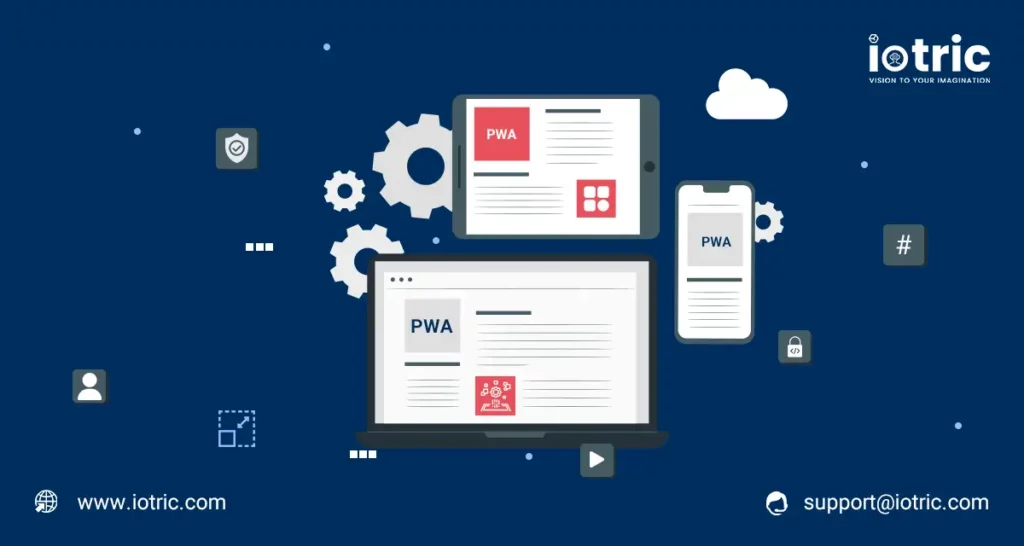Mobile App DevelopmentWeb App Development
A Beginner’s Guide to Progressive Web Apps and it’s Benefits

Are PWAs suitable for your business growth?
Introduction
In today’s digital world, users expect seamless and fast experiences when using websites and apps. However, slow loading times, poor connectivity, and the need for separate apps for different platforms can create frustration for users and businesses alike. This is where Progressive Web Apps (PWAs) come in. PWAs offer a solution to the challenges faced by traditional apps and websites, providing an app-like experience that works on any platform and any device, with fast loading times and offline accessibility. In this blog, we will explore the benefits of PWAs and how they can help businesses provide a superior user experience to their audience.
What is Progressive Web App?
Progressive web app or PWA is a website that delivers an experience as same as a mobile app. Progressive web apps are well known for their ability to work on unstable networks and responsive user interface, fast load time and many more. Correspondingly no requirement is there to share any revenue cut to app stores. PWAs are easy to install and take up minimal space on devices, making them a popular choice among users who demand smooth mobile experiences without cluttering their devices with numerous apps. With PWAs, businesses can provide their users with an app-like experience that works seamlessly across platforms and devices. Overall, PWAs are a game-changer in the world of web applications, meeting the demands of modern users who seek fast and responsive experiences without compromising on functionality.

Advantages of Progressive Web Apps
Progressive:
Progressive enhancing technology has built a progressive web app and works with all browsers. This feature gives you the freedom to dedicate further time to improve the functionality of the application.
Discoverable:
Progressive web app is a progressive website and therefore exposed by search engines.
Responsive
Progressive web apps become accustomed to different screen resolutions and sizes. A decent responsive design can serve the user on multiple devices including future devices also.
Linkable:
Progressive web applications can easily be shared through URLs and so, not require complex installation.
Secure:
Progressive web app is attended through HTTPS to avoid snooping and make it more protected for dealing with users data and dealing out payments.
Disadvantages of Progressive Web Apps
Issues with legacy devices:
Progressive web apps are not compatible by means of legacy policies that run non-operational browsers. Many users still operating on the past devices might aspect these issues and criticize the businesses. In the coming time, we will see resolutions to overcome this issue.
No room for innovation:
Progressive web apps obligate very narrow scope of functionality. Web apps help to perform various processes and to solve a wide range of problems via many features.
Limited browser support:
Progressive web apps are essentially android centric and cannot run on other browsers such as safari and edge. Work is in progress for PWAs to support such browsers.
What Are Native Apps?
Native apps are applications that are specifically built for certain platforms and are written in a language that is accepted by that platform. Native apps are designed to work seamlessly with the devices on which they are installed, enabling them to perform faster and more flexibly than other application types. These apps can directly access the hardware of the device, such as the GPS, camera, microphone, and so on. This direct access to device hardware enables native apps to execute faster, resulting in a better user experience.
Difference Between Progressive Web Apps and Native Mobile Apps
Native apps are designed to run on specific mobile operating systems like iOS and Android. In contrast, Progressive Web Apps (PWAs) are designed to be delivered from a web server and runs in a browser.
Native app development typically takes longer, and developers need to create a single codebase that will work on multiple devices. With PWAs, on the other hand, developers can create a single app that can be accessed from any device with a web browser, regardless of the platform.
PWAs bypass store requirements since users can access them simply by entering a URL into their browser. Updates to PWAs happen automatically without requiring any approval from app stores.
Another key difference between native apps and PWAs is discoverability. Native apps and their pages cannot be indexed by search engines like Google. Users typically find native applications through the app stores. In contrast, PWAs are discoverable via search engines, making them more visible to potential users.
Are PWAs Suitable for Business Growth?
As more and more businesses strive for fast, reliable, easy-to-maintain, and lightweight websites and mobile apps, many are turning to a new technology called Progressive Web Apps (PWAs). With PWAs, developers can reach multiple platforms and devices, including Android and iOS, with just a single codebase. Despite being developed as a web application, PWAs offer the user experience of a sleek mobile application, providing results that are comparable to those achieved with native and hybrid mobile apps. By harnessing the power of PWAs, businesses can enhance their online presence and potentially drive growth.
Conclusion
The future of web applications lies in Progressive Web Apps (PWAs). PWAs are built with modern APIs that enable enhanced capabilities, including improved functionality, reliability, and installability, without taking up too much space. As a result, PWAs are gaining popularity and seeing significant investment in the technology sector. They offer numerous advantages, such as ease of maintenance, smaller size, and lower cost of development, making them a potentially lucrative choice for businesses. In short, Progressive Web Apps offer significant benefits and represent the next generation of web applications.
Read about Flutter vs React Native: Which one to choose in 2023?
Follow us to stay updated: LinkedIn| Twitter | Facebook | Medium | Instagram |